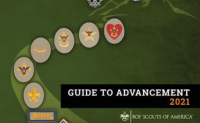 Anyone who serves on a troop committee has most likely participated in a rank advancement board of review. To me, it is an honor and a pleasure to serve on one, for it is through this process that we can gain insight into the youth experience.
Anyone who serves on a troop committee has most likely participated in a rank advancement board of review. To me, it is an honor and a pleasure to serve on one, for it is through this process that we can gain insight into the youth experience.
That is, if we ask the right questions and treat the Scout fairly.
There is much advice on the conduct of a board of review. The canonical definition is contained within the Guide to Advancement, In fact, it is such an important function in our program that an entire chapter (Chapter 8) is devoted to the subject.
If you serve on a board of review, you should read that chapter. I won’t quote it all here, of course, but I think one of the key paragraphs is:
Most adults would admit to nervousness if told they were
to appear before a “board of review.†Imagine how a
boy must feel. A certain level of formality and meaningful
questioning should exist, but it is important that the
atmosphere be relaxed and that the review is conducted
with the Scout Law in mind. It may help if the unit leader
introduces the candidate, and if a few minutes are spent
getting acquainted.
This puts not only our role but our attitude in perspective, and helps to underscore our responsibility to the youth that we are serving.
The Guide contains policies on timeliness, uniforming, makeup of the board and who may (or may not) attend, and some of what should and should not be discussed. Other unofficial publications and websites give lists of suggested questions to ask, which may or may not be relevant but shouldn’t be relied on for the entirety of the session.
The board of review should be looked up on as an informal chat, a chance to get to know the Scout, find out how he is enjoying his experience, what’s going on in his life, and what he’s looking forward to. I like to put more emphasis on review than on board.
But many Scouters somehow equate the term board of review with board of inquisition. They think it’s necessary to grill the Scout about the requirements (or even to retest him), to police his uniform or try to make it a performance review for his position of responsibility.
Actions such as these run counter to the intent and aim of this simple process, but unfortunately they all too frequently occur. While I’ve never been on a board that turned a Scout away for not wearing the correct belt or socks, I’ve heard of it happening.
We have plenty of advice on what to do in a board of review, but how about some of what not to do? Here, then, are a few ways to ruin a board of review:
- Interrupt the Scout. We all love to tell stories, and we think nothing of jumping into the middle of something the Scout is saying to tell him about situations of our own, or to tell the right way to do something, or change the subject. Do:Â Let him speak.It’s his board of review, not yours.
- Don’t make eye contact. Looking around the room, or at your phone or your watch, send the subliminal message that you’re not interested in what the Scout has to say. Do:Â While you don’t have to stare, make eye contact when the Scout is talking. It’s a courtesy and it lets the Scout know you are paying attention to him.
- Use negative body language. Slouching in your chair, crossing your arms or tapping your fingers can give the impression that you’re bored and just want it to be over. Believe me, the Scout probably does, too, but he is showing you the courtesy of being attentive to you. Do: Show him through your body language that you respect him and take his interests to heart.
- Lecture him. Again, we love to talk and adults are full of advice for young people. A board of review is no time for a lecture from an adult (for that matter, it’s rare that adults should lecture Scouts at all). Don’t try to give him cooking lessons, merit badge advice or tell him how to do his job. Do: Ask him about his experiences. Ask what he likes best about Scouting or his patrol. Was there something he learned to do that he’d like to tell you about?
- Act like you know it all. Maybe you were a Scout as a youth; maybe not, but you think you know all about Scouting. Chances are, you don’t really know what it’s like to be a boy in a patrol or a troop. Do: Try to understand Scouting from his perspective. Be genuinely interested in what he has to say and ask insightful questions that draw him out to talk about it.
A properly conducted board of review is a learning experience – as much for the board members than it is for the Scout. He is teaching you what he knows about the youth experience so you can better understand it and support the troop program to make it better. Take advantage of the opportunity to enrich your own knowledge, while helping the Scout to better understand his own.
Photo from November 2008 Scouting Magazine
This post first appeared on Bobwhite Blather.



